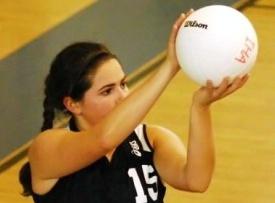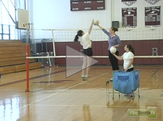PlaySportsTV Volleyball
Youth Volleyball Coaching Tip: Stress Fundamentals and Versatility

Volleyball players gain from being versatile.
To be successful, girls' volleyball players must work together
By Marty Gitlin
Special to PlaySportsTV
Coach Dave Franklin, who has led Lima Central Catholic's girls' volleyball team to an Ohio Division III high school state championship, can’t stress enough the importance of teaching volleyball fundamentals to young players.
Franklin’s first recommendation to youth volleyball coaches is to incorporate movement into every practice. It’s a base for successful instruction.
“Little kids love movement,” Franklin says emphatically. “It keeps their brains engaged. Try not to have them too stationary. Volleyball is a sport of movement. Movement is required for kids to perform different skills.
“The only thing that is done in volleyball that doesn’t require motion is serving. But everything else, from setting to passing to hitting the ball requires motion. So whatever drill you’re doing in practice, do it with movement. If you’re just standing there passing the ball and hitting the ball, it really slows down the pace.”
Franklin adds that it won’t take long before the more talented volleyball players emerge from the pack. But he stresses not to magnify differences in ability. Rather, every player should be made to feel he or she is a valuable part of the team.
He believes that even top volleyball players should be made aware that they can’t succeed alone. They are dependent on all their teammates for both individual and team achievements. It’s a particularly important lesson among younger kids, who are susceptible to learning bad lessons, Franklin adds.
“The way I approach it at that level is similar to the way I approach it with high school kids,” Franklin says. “You have a clue of who is good and who is bad, but you don’t want the better players standing around saying, ‘If I can do it, why can’t you?"
“What you want to do is try to accomplish things together. The best kids need to know that they can’t accomplish anything by themselves. They need to understand that they all have a purpose to the team. That’s all that matters.”
And though some players might not progress as rapidly as others, Franklin recommends that limits should never be placed on potential.
“A coach should never set any expectations on a kid,” he says. “You have to keep pushing them to find out just how much they can do because they’ll surprise you. Don’t say things like, ‘They’re only 8 years old, they can’t do that.’ No. Just try it and push them toward it. If you do, it will give them an opportunity. If you don’t, you’ll never know if they can do it or not.”
The same holds true for positioning youth volleyball players. Franklin believes they should gain experience everywhere on the court at least until the junior high level, and sometimes beyond. He adds the coach is responsible to make players understand that learning all positions is in their best interest.
“We don’t start placing anyone until eighth grade,” Franklin explains. “At the youth level, everyone learns every position. They learn every drill. And even in eighth grade, we don’t get too complex. That’s when we start to look for setters because setter is such a complex position. By ninth and tenth grade we start working them into positions.
“The thing is, especially for female athletes, it takes time for them to grow into their bodies. Volleyball is a game that requires experience.”
Youth volleyball coaches can help forge a bond between a player and the sport, as well as establish a work ethic that will last a lifetime.
###
Story courtesy of Red Line Editorial, Inc.
###
Photo courtesy of Maria Nolan.



